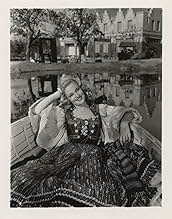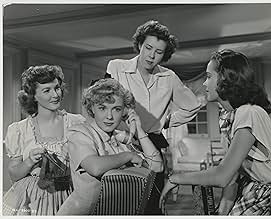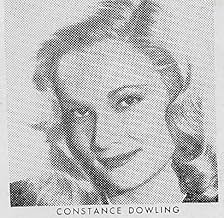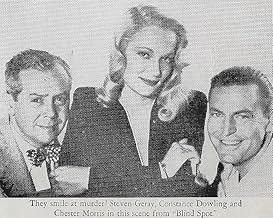Constance Dowling(1920-1969)
- Actress
- Soundtrack
Lovely, exotic-looking, hazel-eyed blonde Constance Dowling was born on July 24, 1920, in New York City, and raised there. One of four children, her younger sister, Doris Dowling, followed her into show business; her two brothers, Richard and Robert did not. Following graduation from Wadleigh High School for Girls, she took classes at the New Theatre School. Lying about her age, a teenage Constance started her career off as a New York model, chorus girl, and nightclub dancer.
Appearing in a number of Broadway productions, she made a minor debut in the 1939 play "Quiet City," directed by Elia Kazan with whom she had a major affair. She then went on to appear in "Liliom" "Panama Hattie (with sister Doris), "Hold On to Your Hats" (Al Jolson's last Broadway show) and "The Strings, My Lord, Are False." In 1943, she moved to California test her luck in films. Briefly favored by mogul Samuel Goldwyn as one of his "Goldwyn Girls," he handed her the prime role of sweet nurse and love interest Mary Morgan in Danny Kaye's second musical movie vehicle Up in Arms (1944). Despite Constance's Broadway musical background, co-star/rival Dinah Shore was handed all the female songs in the picture. Handsome Dana Andrews complete the romantic quadrangle.
In the same year, Constance appeared opposite Nelson Eddy (in his post-Jeanette MacDonald film days), starring as a radical journalist, in the 17th century musical comedy Knickerbocker Holiday (1944). As the only female love interest this time, she would also be pursued by crafty colonial governor Charles Coburn. Although the film version watered-down the political satire and scrapped most of Kurt Weill and Maxwell Anderson's Broadway songs in favor of new ones by the pair and by Jule Styne and Sammy Cahn, Constance did manage to impress with her vocals on new tunes "One More Smile" and "Love Has Made This Such a Lovely Day".
When Goldwyn lost interest in Constance, preferring to promote fellow blonde Virginia Mayo instead, Constance moved on and earned a second femme lead in the romantic comedy The Well Groomed Bride (1946) starring Olivia de Havilland and the femme lead in the Universal film noir Black Angel (1946) co-starring Dan Duryea and June Vincent. She was next loaned to Columbia to play a revengeful escaped jailbird and femme fatale in the crime drama Boston Blackie and the Law (1946) starring Chester Morris and then paired up with Morris again in the crimer Blind Spot (1947).
Once she started moving further down the credits list, as she was for the Republic film noir The Flame (1947) which starred studio mogul Herbert J. Yates' wife Vera Ralston, Constance decided to move to Italy and try and maintain her leading lady career there. Younger sister Doris, who had achieved a modest degree of popularity, would make the same exact move. Together they became the first American actresses to work exclusively in Italian films.
Constance appeared in a number of dramatic showcases while there (1947-1950), starting with Mad About Opera (1948) starring Gina Lollobrigida, followed by Escape (1948), Addio Mimí! (1949), Una voce nel tuo cuore (1949) (A Voice in Your Heart) with Vittorio Gassman, her second Lollobrigida film Miss Italia (1950), and Duel Without Honor (1950) (Duel Without Honor) with Raye Girouard. For the most part, her time spent in Italy did little to advance or elevate her international star.
Returning to the states, Constance studied at the Actor's Studio and focused on TV and appeared in a number of anthologies ("Chevron Theatre," "Pulitzer Prize Playhouse," "Cosmopolitan Theatre," "Fireside Theatre") and a couple of films (she was top-billed in the Italian film Stormbound (1950), and played a scientist in the cult robot sci-fi flick Gog (1954) co-starring Richard Egan) written and produced by Ivan Tors .
Constance married Tors in 1953 and retired from acting. They had four sons (Matthew, Steven, David, Peter) and an adopted child from Kenya (Alfred). During the 1960s she worked as a guide at the Dolphin Laboratory in Saint Thomas, U.S. Virgin Islands. Little else was heard from her, however, until her sudden and untimely death of a heart attack on October 28, 1969. Only 49 years old, she was buried at the Holy Cross Cemetery in Culver City, California.
Appearing in a number of Broadway productions, she made a minor debut in the 1939 play "Quiet City," directed by Elia Kazan with whom she had a major affair. She then went on to appear in "Liliom" "Panama Hattie (with sister Doris), "Hold On to Your Hats" (Al Jolson's last Broadway show) and "The Strings, My Lord, Are False." In 1943, she moved to California test her luck in films. Briefly favored by mogul Samuel Goldwyn as one of his "Goldwyn Girls," he handed her the prime role of sweet nurse and love interest Mary Morgan in Danny Kaye's second musical movie vehicle Up in Arms (1944). Despite Constance's Broadway musical background, co-star/rival Dinah Shore was handed all the female songs in the picture. Handsome Dana Andrews complete the romantic quadrangle.
In the same year, Constance appeared opposite Nelson Eddy (in his post-Jeanette MacDonald film days), starring as a radical journalist, in the 17th century musical comedy Knickerbocker Holiday (1944). As the only female love interest this time, she would also be pursued by crafty colonial governor Charles Coburn. Although the film version watered-down the political satire and scrapped most of Kurt Weill and Maxwell Anderson's Broadway songs in favor of new ones by the pair and by Jule Styne and Sammy Cahn, Constance did manage to impress with her vocals on new tunes "One More Smile" and "Love Has Made This Such a Lovely Day".
When Goldwyn lost interest in Constance, preferring to promote fellow blonde Virginia Mayo instead, Constance moved on and earned a second femme lead in the romantic comedy The Well Groomed Bride (1946) starring Olivia de Havilland and the femme lead in the Universal film noir Black Angel (1946) co-starring Dan Duryea and June Vincent. She was next loaned to Columbia to play a revengeful escaped jailbird and femme fatale in the crime drama Boston Blackie and the Law (1946) starring Chester Morris and then paired up with Morris again in the crimer Blind Spot (1947).
Once she started moving further down the credits list, as she was for the Republic film noir The Flame (1947) which starred studio mogul Herbert J. Yates' wife Vera Ralston, Constance decided to move to Italy and try and maintain her leading lady career there. Younger sister Doris, who had achieved a modest degree of popularity, would make the same exact move. Together they became the first American actresses to work exclusively in Italian films.
Constance appeared in a number of dramatic showcases while there (1947-1950), starting with Mad About Opera (1948) starring Gina Lollobrigida, followed by Escape (1948), Addio Mimí! (1949), Una voce nel tuo cuore (1949) (A Voice in Your Heart) with Vittorio Gassman, her second Lollobrigida film Miss Italia (1950), and Duel Without Honor (1950) (Duel Without Honor) with Raye Girouard. For the most part, her time spent in Italy did little to advance or elevate her international star.
Returning to the states, Constance studied at the Actor's Studio and focused on TV and appeared in a number of anthologies ("Chevron Theatre," "Pulitzer Prize Playhouse," "Cosmopolitan Theatre," "Fireside Theatre") and a couple of films (she was top-billed in the Italian film Stormbound (1950), and played a scientist in the cult robot sci-fi flick Gog (1954) co-starring Richard Egan) written and produced by Ivan Tors .
Constance married Tors in 1953 and retired from acting. They had four sons (Matthew, Steven, David, Peter) and an adopted child from Kenya (Alfred). During the 1960s she worked as a guide at the Dolphin Laboratory in Saint Thomas, U.S. Virgin Islands. Little else was heard from her, however, until her sudden and untimely death of a heart attack on October 28, 1969. Only 49 years old, she was buried at the Holy Cross Cemetery in Culver City, California.
























